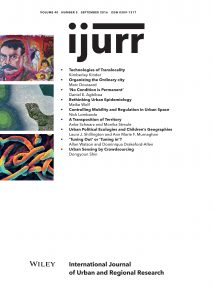In this article, we discuss the concept of territory from a decolonized perspective. We engage with the ongoing debate on decentralizing urban studies to outline the potential drawbacks of essentializing, generalizing or objectifying the urban. Through the socio-territorial approach utilized here we seek to address these issues by shifting attention, first, to the social production of territory, and secondly, from an analysis of state strategies to the urban scale. We understand territory as being produced when subjects struggle over the practices, meanings and tenures of urban space. An example from Mexico City is employed to illustrate how territory becomes both the site and stake of social struggle. By focusing on the subjects involved in the production of territory, and on the way different subjects produce and reproduce hegemonic spaces and counter-spaces, we emphasize three aspects in particular: first, a territory’s specific material conditions; secondly, the imaginarios (social imaginaries) various actors inscribe into it; and thirdly, the communal land use form of the ejido as a unique territorial regulation. Finally, we argue for the empirical groundedness of the concept of territory with the aim of further pluralizing the field of urban studies. The socio-territorial approach we propose explicitly focuses on power relations in the production of both urban space and knowledge.
Details
Written by:
Anke Schwarz and Monika Streule
Digital Object Identifier (DOI)
10.1111/1468-2427.12439
About DOI

